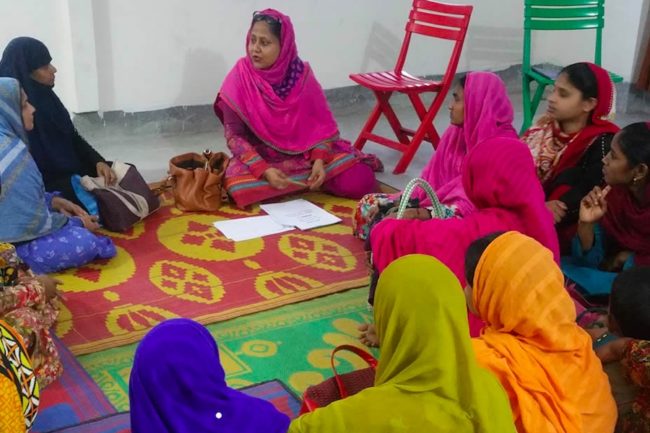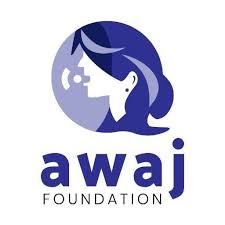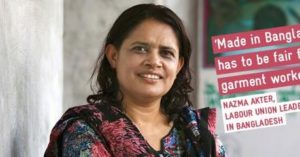Awaj: to ensure the welfare of women in a safe and correct working environment.
15.06.16
A new member of MMM in Bangladesh, the Awaj Foundation has the aim of strengthening the competences of women workers in the textile industry notably in financial literacy and leadership.

Awaj: the “voice” of women workers in the garment industry in Bangladesh

The Awaj Foundation, set up and led by Nazma Akter, defends workers’ rights in the ready-to-wear industry, of whom 85% are women. Awaj, which means “voice” in Bengali, encourages a positive and collaborative approach. The foundation thinks that factory work can be a source of empowerment for women by offering more opportunities and choice. It strives against dangerous working conditions and demands fair and more equal treatment for women workers.
Awaj seeks to solve their problems as women and mothers, even beyond the work environment, so that they can be in control of their lives. Awaj advocates decent working conditions and a safe work environment where mothers are able to breastfeed. Awaj also demands equal access to health care, education, and training, as well as the end to discrimination and violence. Its aim is also to empower women workers through financial literacy and leadership.
Addressing the challenges of family/work life reconciliation to ensure decent work for mothers

Nazma Akter, founding director of the Awaj Foundation
To help realise these objectives, Awaj recently opened a child care centre. The foundation thinks that to improve society in general, it is vital to address the challenges of reconciling family and professional life, as well as maternal health and education: “Our main motivation is to obtain for mothers a safe and decent work environment, to watch over their health and that of their children, and thus to contribute to the general health of families and the country for a better future.”
By becoming a member of MMM, Awaj hopes to reinforce its activities at the national level while participating in an international network to defend the rights of working women, particularly in an international environment. This partnership also allows both Awaj and MMM to share their respective expertise.
More information on the Awaj website
The New EU Gender Equality Roadmap : A Call for Inclusion of Mothers
04.03.25
The European Commission’s initiative on a new Gender Equality Roadmap post-2025, marks a significant step forward in addressing gender disparities across the European Union. Make Mothers Matter (MMM
Breaking the Cycle: Gender Equality as a Path to Better Mental Health
18.03.25
The Council of the European Union has taken a decisive step in recognising the vital connection between gender equality and mental health.
Europe Must Listen to Mothers: Our landmark report heads to the European Parliament
28.08.25
On 22 September 2025, the voices of mothers will take centre stage in Brussels. For the first time, Make Mothers Matter (MMM) will present its State of Motherhood in Europe








